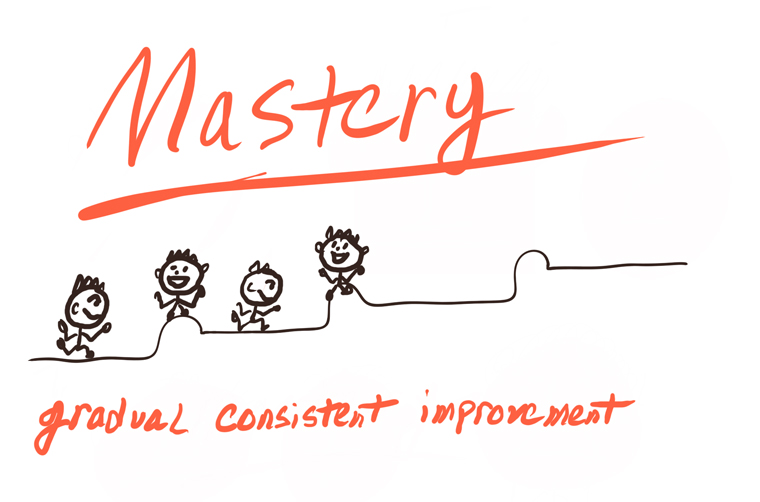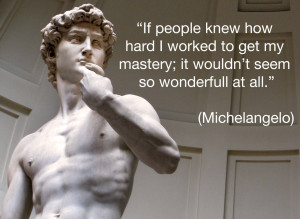
“Contrary to popular wisdom, knowledge is not power – it’s potential power. Knowledge is not mastery. Execution is mastery. Execution will trump knowledge every day of the week.”
— Tony Robbins
Do you remember your first driving experience?
It might have felt awkward and complicated. You had to be extra vigilant while following the rules for safely maneuvering the vehicle. A wary instructor might have been sitting by your side, barraging you with directions.
Over time, you gained confidence in your abilities behind the wheel. After accumulating a sizable mileage, you felt at ease because you didn’t have to put in as much thought and effort as you did in the past. Your abilities ran on auto-pilot mode once you hit the roads.
What happened between the time you were a novice at driving and the time you became a road ninja? The simple answer is that during that stretch of time, you honed your skills by practicing and familiarizing yourself with the procedures.
Your mind got accustomed to the mechanics of driving and you picked up on the many unspoken nuances. You gradually mastered the art of driving.
This is, in essence, the blueprint for mastery, which can be applied in any other domain of life. Unlike what most people believe, experts and geniuses aren’t born: they are made.
We are naturally predisposed to being better at certain things than others because of genetic advantage, but it is not sufficient for achieving mastery. Raw talent and intelligence still needs to be cultivated and nurtured to become a master.
In fact, research has shown that once a person crosses an IQ of 120, there is minimal relationship between more intelligence and better performance. While people with high IQs are good at logical, computational and linear tasks, they may not necessarily have real world intelligence that’s needed to excel in whatever it is they are naturally gifted at doing.
An persons ability to go the distance is indicated by the presence of certain mental dispositions and traits in their character constellation, such as courage, discipline, imagination and sensitivity.
For us to gain proficiency, our mind needs to be trained and conditioned by consistent repetition and deep work. By repeatedly attempting the same task, we strengthen any existing neural connections within our brains and we become a master.
The data gets stored in our subconscious mind and can be swiftly retrieved when the relevant occasion arises. This practice improves our ability to intuit solutions and recognize patterns.
In his book, The Outliers, Michael Gladwell states that it takes 10,000 hours of dedicated practice to truly master a skill, be it playing an instrument, learning a sport or running a business. If we look at anyone who has mastered their craft, we will see that it was their dedication to their craft that influenced their immersion during those 10,000 hours.
Gladwell also goes on to say that the biggest factors for success are not luck or innate talent, but our commitment to our craft. He supported this claim with some examples of famous creative geniuses of our times, such as Bill Gates and The Beatles.

Yet most people lack the emotional bandwidth to apply themselves to the rigors of mastery. They get tempted by the allure of instant gratification or intimidated by the arduous climb towards unguaranteed success.
Those who excel in a particular field are rare commodities, which is why society admires and rewards them. Their exceptional skills and knowledge are highly sought after for both their monetary and intrinsic value.
The good news is that the formula for achieving mastery is not a complicated one. Everyone is capable of following it if they have the tenacity and will. Here are five guidelines on how you can become a master no matter what you tackle in your daily life:
1. Immerse yourself in something you’re passionate about: The simplest way to attain the natural drive to achieve enduring success is to select a vocation that you are passionate and curious about. Your internal motivation will fuel your willingness to rise up to any challenges that you might encounter along the way and also stay fully committed to the process.
2. Gain deep and comprehensive knowledge: To be amongst the top of the line in your field, it’s imperative to have a thorough and comprehensive knowledge that will set you apart from others. Learning and understanding any skill or subject requires dedicated focus and deep engagement for many hours, during which we saturate our mind with relevant books, advice and other research material.
3. Practice, practice, practice: Having text book knowledge is a great start but it’s only through the application of that knowledge that we can reap tangible results. According to Michael Gladwell’s 10,000 hour theory, we will need to put in a sizable number of hours of practice before we can truly gain expertise. We all need that span of time to experiment and engage in trial-and-error so that we can learn from our mistakes and improve our learning curve.
4. Create structure in your environment: The deep work and engagement needed to become a master necessitates an environment that is structured and stable. This includes allotting a designated work space and time slots that are free of distractions and obligations. Bill Gates used to lock himself for hours in isolation to crack complicated programming codes. We also need to build structure within our personal life to maintain emotional and physical balance. It’s a challenge to apply ourselves to any demanding feat if we are tired, stressed out or facing emotional ups and downs.
5. Be patient and focused: The road to success is a potential minefield, filled with unforeseen obstacles and tricky terrain that could throw us off guard. For this reason, we need to fortify our inner reserves to catch any curve balls along the way. Achieving breakthroughs in any endeavor requires courage and a willingness to step out on faith. We have to get comfortable with taking risks and the possibility of encountering failure.
Spiritual leader Deepak Chopra once said, “All creation is pure consciousness and potentiality seeking expression from the unmanifest to the manifest.”
When we take the initiative to nurture our skills and talents, we are essentially acknowledging the pure potentiality that lies within us. We allow this cosmic magic to work through us and for us.
All my best on your journey,
Seline
Questions for you: Is there a subject or topic that you would like to master? If so, how will you go about achieving it?
Did you like this post? Sign up below and I’ll send you more awesome posts like this one every week.


Hey Seline…I totally agree with the steps you have outlined here….
Many people consider me to be a master of the plant world. it is a love and a skill I seemed to have naturally and with education and year of hands on training it has become something I am not only passionate about but quite good at.
I even made a living for a number of years using this knowledge and skill. So I’m living proof that it CAN be done and you can be successful in the real world!